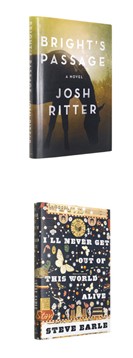No surprise there. After all, they’re crossover artists—darlings of folk, rock, and country audiences—and now their genre-bending appeal has simply found an outlet at the keyboard instead of the fret board. Many writers—one hesistates to use the adjective fussy—need silence and solitude and routine when working, but these two musicians had no such luxury. Earle, in starts and stops, distracted by concerts and albums, by love and by life, by television guest spots on The Wire and Treme, took more than eight years to go from first to final draft. “This novel thing is tough,” the fifty-six-year-old says. “I mean, I’m so slow. So slow. Thirty words a minute at best. Pecking away. It’s so grueling for me. I hate writing, love having written. It’s hard. Physically, mentally, it sure beats the shit out of you.”
In May Houghton Mifflin Harcourt published Earle’s first novel, I’ll Never Get Out of Here Alive, which follows Doc Ebersole—an addict renting a room in the red-light district of San Antonio in 1963—who is haunted by the ghost of Hank Williams and who performs abortions and mends gunshot wounds to support his morphine habit. “They say write what you know,” Earle, a native Texan and former heroin addict, jokes. “So, you know, I did.”
An album of the same title, produced by T Bone Burnett, will appear around the same time as the novel. “I wanted to push the poetry as hard as I could,” Earle says, referring to both the novel and the album. He is especially good at channeling the vernacular. Listen to Copperhead Road or Guitar Town and you’ll recognize that his songs sometimes feel like voice pieces—like a Barry Hannah or a Larry Brown story—and in much the same way, as a novelist he knows how to turn a sentence, how to capture the music of everyday speech, with a honky-tonk voice ravaged by cigarettes.
Ritter, too, found it difficult to carve out time. “But I made it happen. I wrote backstage. I wrote on the bus. I’d put on my headphones, sit in front by the driver, and just write. For an hour, maybe an hour and a half. That’s about how much water’s in the bucket for a day.” In this way, he scratched out his first draft in sixty days.
This month, so many revisions later, Dial Press will publish his debut, Bright’s Passage. Ritter’s songs sometimes feel like full-blooded fables and folk tales, and his novel has a similar vision, the vision of a disturbing and beautiful dream. Henry Bright, a newly widowed World War I vet, flees with his infant son (and a guardian angel with attitude) as a forest fire and his cruel in-laws pursue him through the hills of West Virginia.
The story began as a song. “But it felt unfinished to me,” the thirty-four-year-old says. “I had no carpenter’s pride in it. That’s the sign of a good song—knowing when it’s done—and this wasn’t, so I sat with it a few days, played with it, and it grew and grew, and I figured, this was my chance to work on something new.”
Ritter is driven by images. A forest on fire. A horse in a steeple. And ideally, when people listen to his songs or read his novel, he wants them to feel as though they have had their fortune read. “I got really interested a while ago in Tarot cards—these strong images that are dealt to you on a table and you draw the connections and meaning from them. And with a song, or fable, or story of a certain type, that’s really appealing to me. Throwing down an image and not being too instructive and allowing the audience to draw their own moral conclusions.”
Reluctant readers might worry—when they consider the fragmented choppiness of Bob Dylan’s memoir Chronicles: Volume One, for example—that a songwriter might not be able to sustain a longer narrative, but Earle and Ritter have, in their very different ways, written haunting ballads that sing off the page.
Benjamin Percy is the author of a novel, The Wilding (Graywolf Press, 2010), and two books of stories, Refresh, Refresh (Graywolf Press, 2007) and The Language of Elk (Carnegie Mellon, 2006). He teaches in the MFA program in creative writing and environment at Iowa State University.










